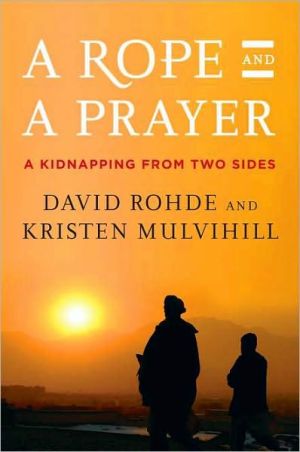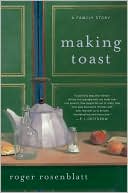A Rope and a Prayer: A Kidnapping From Two Sides
The compelling and insightful account of a New York Times reporter's abduction by the Taliban, and his wife's struggle to free him.\ Invited to an interview by a Taliban commander, New York Times reporter David Rohde and two Afghan colleagues were kidnapped in November 2008 and spirited to the tribal areas of Pakistan. For the next seven months, they lived in an alternate reality, ruled by jihadists, in which paranoia, conspiracy theories, and shifting alliances abounded. Held in bustling...
Search in google:
The compelling and insightful account of a New York Times reporter's abduction by the Taliban, and his wife's struggle to free him. Invited to an interview by a Taliban commander, New York Times reporter David Rohde and two Afghan colleagues were kidnapped in November 2008 and spirited to the tribal areas of Pakistan. For the next seven months, they lived in an alternate reality, ruled by jihadists, in which paranoia, conspiracy theories, and shifting alliances abounded. Held in bustling towns, they found that Pakistan's powerful military turned a blind eye to a sprawling Taliban ministate that trained suicide bombers, plotted terrorist attacks, and helped shelter Osama bin Laden. In New York, David's wife of two months, Kristen Mulvihill, his family, and The New York Times struggled to navigate the labyrinth of issues that confront the relatives of hostages. Their methodical, Western approach made little impact on the complex mix of cruelty, irrationality, and criminality that characterizes the militant Islam espoused by David's captors. In the end, a stolen piece of rope and a prayer ended the captivity. The experience tested and strengthened Mulvihill and Rohde's relationship and exposed the failures of American effort in the region. The tale of those seven months is at once a love story and a reflection of the great cultural divide-and challenge-of our time. Publishers Weekly For a harrowing seven months of captivity, Rohde, a Pulitzer Prize–winning New York Times foreign correspondent on assignment in war-torn Afghanistan, survived after being kidnapped, with two Afghan colleagues, by the Taliban in November 2008, suffering from all of the cruel terrorist maneuvering and hapless government countermoves during the crisis. Rohde wrote a series of articles for the Times about his experiences, but here Rohde alternates chapters with Mulvihill, to whom he had been married for two months at the time of his kidnapping. In suspenseful prose, he recounts his abduction and she describes her efforts, along with those of the Times, to secure his release by writing everyone in government and negotiating with the Taliban. Rohde's escape, with one of his colleagues, received major media coverage. Possibly the most informative segments of the book are the masterly observations of life with the jihadists, the chaotic Pakistani tribal areas and the topsy-turvy war itself. This potent story of love and conflict ends well, but not without making some smart and edgy commentary on terrorism, hostage negotiation, political agendas, and the human heart. Map. (Nov.)
\ Publishers WeeklyFor a harrowing seven months of captivity, Rohde, a Pulitzer Prize–winning New York Times foreign correspondent on assignment in war-torn Afghanistan, survived after being kidnapped, with two Afghan colleagues, by the Taliban in November 2008, suffering from all of the cruel terrorist maneuvering and hapless government countermoves during the crisis. Rohde wrote a series of articles for the Times about his experiences, but here Rohde alternates chapters with Mulvihill, to whom he had been married for two months at the time of his kidnapping. In suspenseful prose, he recounts his abduction and she describes her efforts, along with those of the Times, to secure his release by writing everyone in government and negotiating with the Taliban. Rohde's escape, with one of his colleagues, received major media coverage. Possibly the most informative segments of the book are the masterly observations of life with the jihadists, the chaotic Pakistani tribal areas and the topsy-turvy war itself. This potent story of love and conflict ends well, but not without making some smart and edgy commentary on terrorism, hostage negotiation, political agendas, and the human heart. Map. (Nov.)\ \ \ \ \ Kirkus ReviewsFrom a New York Times journalist and his wife, a blow-by-blow chronicle of his kidnapping in Afghanistan in November 2008 by the Taliban, hisseven months of captivity and eventual escape.\ Pursuing an interview with a Taliban commander for a book he was writing about the American effort in Afghanistan, Pulitzer Prize–winning reporter Rohde made an imprudent arrangement to meet the leader outside of Kabul and was kidnapped, along with an Afghan journalist, Tahir Luddin, and their driver, Asad Mangal. Kidnappings were not uncommon, and in his rush to get a good story, Rohde recognized that he had put Tahir and Asad at a huge risk. Moreover, he was recently married. His wife, photo and fashion editor Mulvihill, took over the ransom negotiations in New York, quietly advised by Rohde's brother Lee, representatives at the Times, the FBI, an outside security firm (American International Security Corporation) and numerous ex-hostages and their families. In alternating chapters, husband and wife chronicle their parallel ordeals. Rohde and the two other hostages were moved to remote tribal areas in Miran Shah, the so-called Pashtun belt making up the intractable border between Afghanistan and Pakistan, where the Taliban and al-Qaeda maintain their training camps. The men cooked, cleaned and prayed, wiling away the time discussing religion and playing Checkah [sic] with their captors. The couple spoke rarely over carefully monitored phone calls, and the Taliban sent several alarming videos. The kidnappers wanted millions for the hostages, as well as an exchange of prisoners, but no one could agree to terms over the ensuing months. Rohde and Tahir's escape in June 2009 was truly remarkable and bold, and his unique take on the hard-line Islamist movement provides many astute observations.\ A painstakingly reconstructed, harrowing account by a seasoned expert in the region.\ \ \ \ Philip Caputo…a harrowing narrative of two captivities…an important and valuable story of love, faith and courage.\ —The Washington Post\ \ \ \ \ Anna BadkhenA Rope and a Prayer is a firsthand account of one war-zone assignment gone devastatingly wrong. In this book David Rohde, a correspondent for The New York Times, and his wife, Kristen Mulvihill, take turns recounting in meticulous detail his 7 months and 10 days in Taliban captivity in Afghanistan and Pakistan, and her harrowing negotiations for his release. Their intertwined stories reflect two intensely personal consequences of myopic, lopsided international meddling in the brutalized and neglected region that straddles the border between Central and South Asia. \ —The New York Times\ \








